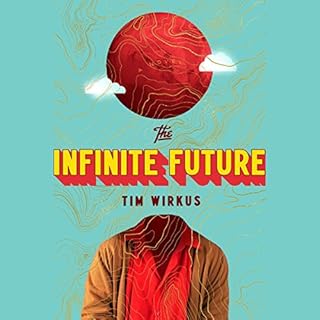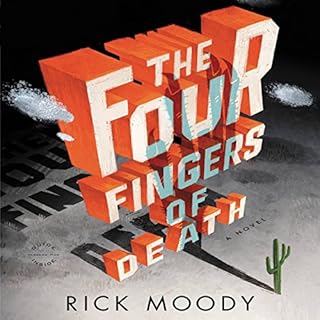Jack Foster
- 8
- opiniones
- 207
- votos útiles
- 18
- calificaciones
-
The Infinite Future
- A Novel
- De: Tim Wirkus
- Narrado por: Michael Crouch, Jonathan Davis, Hillary Huber, y otros
- Duración: 13 h y 15 m
- Versión completa
-
General3.5 out of 5 stars 24
-
Narración:4 out of 5 stars 24
-
Historia3.5 out of 5 stars 23
The Infinite Future is a mind-bending novel that melds two addictive tales in one. In the first, we meet three broken people, joined by an obsession with a forgotten Brazilian science-fiction author named Salgado-MacKenzie. The motley trio sets off to discover his identity, and find his fabled masterpiece. In the second half, Wirkus gives us the lost masterpiece itself - the actual text of The Infinite Future, Salgado-MacKenzie's wonderfully weird magnum opus.
-
1 out of 5 stars
-
Mormon Lit
- De Jack Foster en 01-23-18
- The Infinite Future
- A Novel
- De: Tim Wirkus
- Narrado por: Michael Crouch, Jonathan Davis, Hillary Huber, full cast
Mormon Lit
Revisado: 01-23-18
Just a head's up, it might be worth noting that this book is effectively a piece of Mormon literature as much as it is pseudo-sci-fi. Most of the characters are practicing mormons, and while clearly not a tract, Mormonism is discussed and defended and a lot of Mormon dogma gets milled over (a central character is Mormon President). Your mileage may vary, I never felt like I was being preached to or converted but you will also notice a lack of things outside of the Mormon reckoning, like cussing, sex or the existence of homosexuals. Some readers will have no problem with this, others who might should consider themselves tipped off.
Se ha producido un error. Vuelve a intentarlo dentro de unos minutos.
Has calificado esta reseña.
Reportaste esta reseña
esto le resultó útil a 15 personas
-
Carter & Lovecraft
- De: Jonathan L. Howard
- Narrado por: Ari Fliakos
- Duración: 9 h y 19 m
- Versión completa
-
General4.5 out of 5 stars 2,739
-
Narración:4.5 out of 5 stars 2,527
-
Historia4.5 out of 5 stars 2,528
Daniel Carter used to be a homicide detective, but his last case - the hunt for a serial killer - went wrong in strange ways and soured the job for him. Now he's a private investigator trying to live a quiet life. Strangeness, however, has not finished with him. First, he inherits a bookstore in Providence from someone he's never heard of, along with an indignant bookseller who doesn't want a new boss.
-
4 out of 5 stars
-
A mistakes that worked out in my favor.
- De Frae en 03-06-17
- Carter & Lovecraft
- De: Jonathan L. Howard
- Narrado por: Ari Fliakos
Disappointing
Revisado: 11-13-15
I was intrigued by the premise. A few chapters in I was disappointed & I've had a hard time finishing it. I'll explain why:
1. These aren't characters. I think maybe he's going for a boilerplate, noir-ish, rock-jawed Marlowe type, but you don’t walk away with a sense of him as anything other than a pastiche.
The supporting cast is worse: there are the usual suspects, mustache twirling, sneery bad guy, smug rich-guy politician, dumb cop, but the biggest offense is they’re usually just mouthpieces for wikipedia-fueled info dumps: A bookseller with no reason at all to have insight into such things goes into a long explanation of a failed attempt to rig the Irish lottery. The villain gives a long, tedious explanation about math theory to a store clerk.
Wait, let me stop there, cos the villain is a whole problem unto himself. He doesn’t just broadcast his secret knowledge of how he manipulates reality, he also calls up the main character to give him leads on who his accomplices are. It’s not just sloppy plotting, the book hinges on these kinds of leaps: two characters discussing the mystery? At the heart of the book (something concerning an aluminum cube I’m still not clear on and too uninvested in to go back and try to figure out) put forth a pretty ludicrous theory, and because this is (of course) the plot, it is instantly accepted as gospel truth and moved forward with without any fact checking. (By a detective!!) It isn’t stumbled upon, or deduced, it’s just programed into the characters’ mouth and comes out when required. A lot of the plot chugs along like this (and this book purports to be a mystery) plot isn’t uncovered, it’s fed; plot coupons are doled out by background characters like NPCs in a video game.
2. The writer is a goodish plotter; he comes up with interesting ideas, but not a skilled technician as far as taking those concepts and turning them into a fun yarn that is enjoyable to read. Especially when writing about the fantastic, you're trying to describe something the reader hasn't necessarily seen but the author is especially clumsy in this regard: there are markings on an artifact, simply described as 'striations', then he'll repeat the word over and over again, so you're getting bludgeoned with a indistinct word that you don't quite understand in the first place. Are they like letters? Cuneiforms? This happens again with the 'surface' of some sort of air that's also water, he doesn't sell the concept then reeats the word surface like 10 times. the surface was almost to his head, he could feel the surface near his lips, what would happen if the surface covered his head, etc. I guess a guy drowns on air? Doesn't matter in the next scene he's someplace else.
3. This is more of a pet peeve of mine, but the hero has a sort of plot immunity that is never fully explained. Some strange malady causes people to react in an instant and put a gun to their head and kill themselves, except, when it happens to him, for some reason it doesn't work. For no other reason than he's the main character. He gets saved from death a few times in a way I still don't understand, a kind of deus ex machina.
Now, as I write this stuff down and really think about it, this book is actually terrible. It’s a mess. The Lovecraft stuff, if that’s what you’re here for, it’s really short on. If you like serial killer, yarn-wall procedural stuff, you’re also going to be disappointed. If you want a hard boiled noir story, you’re going to be most disappointed of all, ‘cos the writer broadcasts (quite frequently) his avid distaste for PI tropes (though the lead is a PI). All this stuff gets tossed in a pot and stewed till its mush and in the end, nothing surprising happens and most disappointing of all, it’s particularly joyless to read.
Narration was fine.
Se ha producido un error. Vuelve a intentarlo dentro de unos minutos.
Has calificado esta reseña.
Reportaste esta reseña
esto le resultó útil a 16 personas
-
Station Eleven (Television Tie-in)
- A Novel
- De: Emily St. John Mandel
- Narrado por: Kirsten Potter
- Duración: 10 h y 40 m
- Versión completa
-
General4.5 out of 5 stars 14,074
-
Narración:4.5 out of 5 stars 12,505
-
Historia4 out of 5 stars 12,490
Kirsten Raymonde will never forget the night Arthur Leander, the famous Hollywood actor, had a heart attack on stage during a production of King Lear. That was the night when a devastating flu pandemic arrived in the city, and within weeks, civilization as we know it came to an end.
-
3 out of 5 stars
-
gah!
- De Stacy en 10-08-14
- Station Eleven (Television Tie-in)
- A Novel
- De: Emily St. John Mandel
- Narrado por: Kirsten Potter
DON'T FALL FOR THE HYPE: THIS BOOK IS TERRIBLE!!
Revisado: 10-14-14
I am really struggling to understand what people like about this book. This book is terrible.
The characters are so poorly drawn. Arthur, a vapid movie star drifts from woman to woman without conscience. His existence as a movie star is dimly imagined as if through the lens of a person who only reads UsWeekly. His craft is only discussed inso far as to ruminate (uninterestingly) on celebrity (actors sacrifice privacy, paparazzi are opportunist scum, the money and glamour are ultimately unfulfilling: nothing illuminating here)
Miranda lives with some dude for a few years, wakes up one day decides to move in with a movie star she bed the night before time passes & with no real understanding of what went wrong between them (or why they even liked each other) she becomes, apropos of no sort of instruction or schooling, based solely on a temp job she took several years earlier, a shipping magnate (but only after discovering the right pair of shoes!) In her spare time she writes and draws a graphic novel she never intends to publish, and most frustratingly, the author and nearly every character & even Miranda herself continually blur the distinction between a comic *book* and comic *strip*. Then there's several members of a post-apocalyptic orchestra who are boilerplate and interchangeable (was there a difference between Deiter & August). Oh! And there's a guy who is a paparazzo but only for a while before becoming an EMT cos THAT happens. This book is so shitty it's actually making me mad.
Then there's the apocalypse. If you are looking for a new or evolved spin on the end of the world plague story look elsewhere, survivors in this book do the same things you've already seen in a bunch of other (better) books: walk a lot, miss electricity and especially mobile devices, learn to hunt and fish and basically do everything you've probably already thought of yourself if you were ever high and wondered what would happen if the world ended in a great big plague. Scratch that, you probably came up with more interesting things when you were high, like, I'd live in the White House or inside the Statue of Liberty.
The book lacks intelligence, none of the characters are especially engaging, the quality of the writing is strong in spots but not sufficient enough to excuse the very flimsy plotting & character work. This is easily one of the most disappointing books I've read in a long time. About halfway through I considered quitting it, after finishing it I wish I had, it never improved. Meaningless characters drift and then it ends.
Se ha producido un error. Vuelve a intentarlo dentro de unos minutos.
Has calificado esta reseña.
Reportaste esta reseña
esto le resultó útil a 91 personas

-
Slouching Towards Bethlehem
- De: Joan Didion
- Narrado por: Diane Keaton
- Duración: 6 h y 52 m
- Versión completa
-
General4.5 out of 5 stars 1,815
-
Narración:4.5 out of 5 stars 1,598
-
Historia4.5 out of 5 stars 1,582
Universally acclaimed from the time it was first published in 1968, Slouching Towards Bethlehem has been admired for decades as a stylistic masterpiece. Academy Award-winning actress Diane Keaton (Annie Hall, The Family Stone) performs these classic essays, including the title piece, which will transport the listener back to a unique time and place: the Haight-Ashbury district of San Francisco during the neighborhood’s heyday as a countercultural center.
-
4 out of 5 stars
-
Didion deserves better.
- De Victoria Wright en 01-21-13
- Slouching Towards Bethlehem
- De: Joan Didion
- Narrado por: Diane Keaton
Great Essays - Bad Narration
Revisado: 11-15-13
I am a fan of Joan Didion & am very pleased that so much of her work is available on Audible.
Diane Keaton does such a bad job. Her voice is slurry and laconic, through a lot of passages she sounds bored. The entire Hawaii essay is read as if by a person being forced to do it. She gets lost in sentences, she reads with no real interest. It's droney and to be honest I found my mind wandering through much of her reading.
If you would like to hear Joan Didion read by an accomplished narrator, check out the White Album, the reader there gives one of the best performances I've ever heard on Audible.
Se ha producido un error. Vuelve a intentarlo dentro de unos minutos.
Has calificado esta reseña.
Reportaste esta reseña
esto le resultó útil a 16 personas
-
The Goldfinch
- De: Donna Tartt
- Narrado por: David Pittu
- Duración: 32 h y 24 m
- Versión completa
-
General4.5 out of 5 stars 41,628
-
Narración:4.5 out of 5 stars 37,527
-
Historia4.5 out of 5 stars 37,481
The Goldfinch is a haunted odyssey through present-day America and a drama of enthralling force and acuity. It begins with a boy. Theo Decker, a 13-year-old New Yorker, miraculously survives an accident that kills his mother. Abandoned by his father, Theo is taken in by the family of a wealthy friend. Bewildered by his strange new home on Park Avenue, disturbed by schoolmates who don't know how to talk to him, and tormented above all by his unbearable longing for his mother, he clings to one thing that reminds him of her: a small, mysteriously captivating painting that ultimately draws Theo into the underworld of art.
-
2 out of 5 stars
-
Boy, am I in the minority on this one.
- De Bonny en 11-04-13
- The Goldfinch
- De: Donna Tartt
- Narrado por: David Pittu
I loved this great book
Revisado: 11-07-13
I loved this book. The narrator, who we meet when he is 13, recounts the often amazing story of how he, by chance, comes into possession of a priceless work of art, and over the many years of his life his connection with it and the often unseen control it exerts over his life.
The story itself is well plotted, a large (though not sprawling) machine with many cogs that work in wide, eccentric arcs; but what makes the book great is the deep insight into human connections and the often breathtaking quality of the prose, especially as it relates to those above mentioned connections.
I give nothing away by revealing the central character of the novel, Theo, loses his mother early in the book and the passages about his grief and longing for her are painfully, concisely accurate and movingly expressed. After her sudden and painful departure, Theo's life becomes a study in various kinds of deeply felt loneliness, but, by contrast, in a way the book is about the connections we make; the starkness of his isolation makes the glow of the love and friendship he finds and struggles with all that much stronger. In particular the central relationship is the one between him and the painting itself and even the simple physical descriptions of the painting are informed and radiant. And, of course, since it's a Donna Tartt novel there is a dream sequence that is absolutely electric, I don't know if it's fair to call this a trope of hers but it's something she writes exceptionally well and you spend half the novel looking for it and when it arrives it does not disappoint.
I have read all three of Donna Tartt's novels ( I really loved 'the Little Friend' ) and I would have to say I think this one may be my favorite.
The narrator does an excellent job, he has consistent voices for each character, he has a great instinct for delivery and his voice is a great match for this story, it's hard for me to think of Theo and not hear his voice.
I would just like to say, one more time, this is a great, great book. It starts strong, and goes and goes and mostly does not disappoint. I don't leave a lot of reviews but every now and then, and I'm sure you've had this experience, you read something so good you just want to tell everybody. great book, please go and enjoy.
Se ha producido un error. Vuelve a intentarlo dentro de unos minutos.
Has calificado esta reseña.
Reportaste esta reseña
esto le resultó útil a 5 personas
-
The Talisman
- De: Stephen King, Peter Straub
- Narrado por: Frank Muller
- Duración: 28 h
- Versión completa
-
General4.5 out of 5 stars 16,601
-
Narración:4.5 out of 5 stars 13,471
-
Historia4.5 out of 5 stars 13,432
On a brisk autumn day, a 13-year-old boy stands on the shores of the gray Atlantic, near a silent amusement park and a fading ocean resort called the Alhambra. The past has driven Jack Sawyer here: His father is gone, his mother is dying, and the world no longer makes sense. But for Jack everything is about to change. For he has been chosen to make a journey back across America - and into another realm. One of the most influential and heralded works of fantasy ever written, The Talisman is an extraordinary novel of loyalty, awakening, terror, and mystery.
-
4 out of 5 stars
-
Still Good
- De Bill S. en 03-24-10
- The Talisman
- De: Stephen King, Peter Straub
- Narrado por: Frank Muller
IRRITATING NARRATOR
Revisado: 10-19-13
The story is enjoyable, but the narrator is especially challenging. He has a weird vocal tick and draws out the last word of every sentence. He draws the word out and fries his voice "so a sentence like this ends like THISSSSSS" It starts to take on the cadence of poetry and is highly distracting. So if these kind of things ruin an audio experience for you skip it and read the book instead.
Se ha producido un error. Vuelve a intentarlo dentro de unos minutos.
Has calificado esta reseña.
Reportaste esta reseña
esto le resultó útil a 1 persona
-
The Four Fingers of Death
- De: Rick Moody
- Narrado por: Chris Patton
- Duración: 27 h y 48 m
- Versión completa
-
General3.5 out of 5 stars 59
-
Narración:4 out of 5 stars 39
-
Historia3.5 out of 5 stars 38
Montese Crandall is a downtrodden writer whose rare collection of baseball cards won't sustain him, financially or emotionally, through the grave illness of his wife. Luckily, he swindles himself a job churning out a novelization of the 2025 remake of a 1963 horror classic, "The Crawling Hand." Crandall tells therein of the United States, in a bid to regain global eminence, launching at last its doomed manned mission to the desolation of Mars.
-
5 out of 5 stars
-
I loved this book!!
- De Jack Foster en 12-07-10
- The Four Fingers of Death
- De: Rick Moody
- Narrado por: Chris Patton
I loved this book!!
Revisado: 12-07-10
I had the same reservations as you, the concept could collapse under its own weight, I don't like my sci-fi coming from lit-fic, etc. but I have a lot of time to kill at my job and it's like 23 hours long so I gambled and WON, this book is a total treat! Sufficiently pulpy, slightly satiricritical (the future here reminded me of Super Sad Love Story) but the novel is ultimately pinned to the aching space of the void. The spacewalk is, at its heart, an ode to lonesomeness. The 'introduction' took some getting through, and of the 2 parts I liked the Mars journey more, it had a very similar feel to Chris Ware's "Seeing Eye dogs of Mars" from Acme #19. And the narrator WAS PERFECT FOR THIS! If you're curious give it a shot. I loved it!!
Se ha producido un error. Vuelve a intentarlo dentro de unos minutos.
Has calificado esta reseña.
Reportaste esta reseña
esto le resultó útil a 9 personas
-
Under the Dome
- A Novel
- De: Stephen King
- Narrado por: Raul Esparza
- Duración: 34 h y 24 m
- Versión completa
-
General4.5 out of 5 stars 28,998
-
Narración:4.5 out of 5 stars 22,205
-
Historia4.5 out of 5 stars 22,212
On an entirely normal, beautiful fall day in Chester's Mill, Maine, the town is inexplicably and suddenly sealed off from the rest of the world by an invisible force field. Planes crash into it and fall from the sky in flaming wreckage, a gardener's hand is severed as "the dome" comes down on it, people running errands in the neighboring town are divided from their families, and cars explode on impact. No one can fathom what this barrier is, where it came from, and when - or if - it will go away.
-
3 out of 5 stars
-
Glad I Listened to 11-22-63 First
- De Russell en 02-09-12
- Under the Dome
- A Novel
- De: Stephen King
- Narrado por: Raul Esparza
EXCELLENT NARRATION!
Revisado: 11-28-09
. . . and a nice return to form for Stephen King, an ensemble epic in 'the Stand' fashion his writing is as nimble and acute as it has been in years.
I have to disagree with the previous reviewer, however, the narration in this is a standout, easily the best I've heard in a long time. he gives the characters (of which there are numerous) distinctive voices that are easily identifiable (which helps with such a large cast) and also very true to the hew of the characters. Not monotone in the least, sound quality is crystal clear and he delivers with a good ear for tone.
I would definitely download another audiobook from this narrato again.
Se ha producido un error. Vuelve a intentarlo dentro de unos minutos.
Has calificado esta reseña.
Reportaste esta reseña
esto le resultó útil a 3 personas







